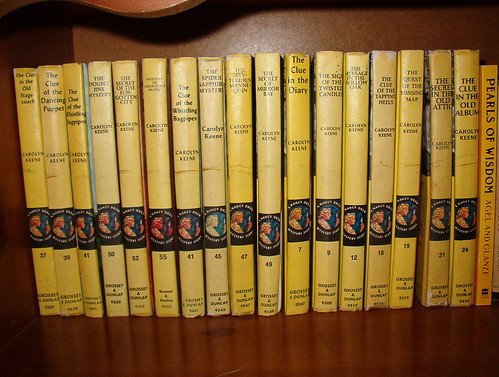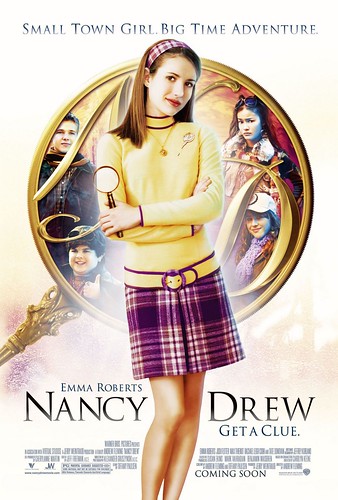Even if you haven't read the books, or seen the movies, you've heard the name Nancy Drew. She's a famous book detective, and through the years she's been edited, adapted and re-packaged endlessly so she can keep on being relevant. And it's worked, because we all still know who she is -- and she's been a teenager since the 1930s.
The Books
Nancy Drew was born on the page in 1930, to be exact, with The Secret of the Old Clock. This first book spawned an entire series that's going on 83 years old. The many, many books in the series are written under the name Carolyn Keene, a person who does not exist. Several ghostwriters have been responsible for crafting Nancy's adventures over the years.
Ghostwriters were also used to change those stories. Nancy underwent her first big re-branding in 1959, to eliminate racist stereotypes and other subject matter that didn't make for appropriate reading in those times of Civil Rights. Drew changed again in the 1980s, becoming a bit older and more professional in her detective endeavors. The entire original series wasn't ended until 2004, when Nancy Drew re-emerged under the Girl Detective mystery series. She's way more PC in this version, and even drives an electric car (gas is in the past, kids).
Despite all the changes, or maybe because of them, Nancy has remained highly popular among YA readers through the years More than 80 million books featuring her have been sold around the world. She's also appeared in no less than 5 feature-length films, two TV shows and more computer games than you can shake a mouse at.
She began as a 16-year-old amateur sleuth bent on solving mysterious crimes. Later, she became 18 years old. Nancy lives in River Heights (which does not exist) with her father Carson Drew, a successful lawyer. Housekeeper Hannah provides the mothering influence that Nancy needs, as she lost her biological mother when she was very young. In the original stories, Nancy's mom left the picture when she was 10. Later, Nancy was 3 when her mother died. Nancy also has a love interest, Ned Nickerson, who goes to Emerson College.
Nancy Drew has a truly mind-boggling array of skills. In addition to being beautiful, she speaks French, knows how to drive boats, paints and understands the intricate workings of the human mind. She also swims, sews, cooks, plays golf and tennis, rides horses, dances like a pro, knows first aid and, of course, plays bridge (some sort of card game). She also has a seemingly inexhaustible income, and usually tools around in a blue convertible. All this, in spite of the fact that she doesn't accept money for her detecting efforts. Solving the crime is more than compensation enough for Nancy Drew.
Most of the Nancy Drew books written between 1930 and 1959 were penned by a woman named Hannah Gruen, herself a very self-confident and self-possessed independent woman. She drew some flak for making Nancy too assertive and confident, and interjected lines throughout the book where Nancy is talking "sweetly" or "kindly" to people to tone down her perceived abrasive nature. Harriet Adams took charge of the series in 1959, going through all the books to make the needed changes to eliminate racism.
The books are somewhat formulaic in nature, but no less enjoyable for it. Each revolves around a specific mystery, upon which Nancy stumbles accidentally or has been asked to solve by some other character. She sometimes has help with these mysteries, but invariably ends up solving every clue herself. She's pretty and she's stylish, but Nancy isn't afraid to go anywhere, do anything or confront anyone. She always has a flashlight within easy reach, and thinks nothing of creeping through cellars or climbing around attics. A cursory nod to character development is given, and if you read the series you'll notice new developments in the lives of the people who surround Nancy Drew.
Several new series were created to re-introduce Nancy over the years, including The Nancy Drew Files and Nancy Drew on Campus. Nancy broke up with Ned during this series, and became the leading lady of Girl Detective in 2003. She's been through many changes over the years in the literary world, but Nancy Drew has been adapted several times on the screen as well.
The Movies
Actress Bonita Granville became Nancy Drew in four different Warner Bros. films during the 1930s. The stories became more comedy than mystery, and the self-assured Nancy of the early books became vapid and silly on the silver screen. Ned's name was changed to Ted for reasons unknown. These films are very hard to find, but you can sometimes see them on TCM.
Nancy came to the small screen in the 1970s, this time played by actress Pamela Sue Martin (and later, when Pamela left, by Janet Louise Johnson). This Nancy was more assertive and bold, more like the original storybook Nancy, but arguably didn't look a thing like the character described on the page. Tracy Ryan played Nancy in a very brief 1995 TV series, and she didn't really look like Nancy either.
Nancy Drew languished in film obscurity until 2007, when Warner Bros. produced a fairly big-budget, highly promoted film version of the classic stories. Emma Roberts played Nancy, who was moved into the modern era. The adaptation does take a few tongue-in-cheek moments to poke fun at the long history of the Nancy Drew series, but in this version she's back to being very smart and less concerned about romance, more like the 1930s version of the character. Rumor has it that Roberts has already agreed to appear in the sequel.
In this version, Nancy has recently moved, temporarily, with her father Carson from River Heights. And because she's Nancy, she picked a rental house with its own built-in mystery. It's the former home of a somewhat obscure film star, Dehlia Draycott, who was mysteriously murdered (some sources say that the character was based on Natalie Wood, a well-known actress who did become the victim of a still-unsolved crime). But Carson doesn't approve of Nancy's sleuthing, and hopes that she'll become more "normal" while living in California.
That's not who Nancy is. She ends up throwing herself into the mystery wholeheartedly, as usual, and begins to unravel all the clues. Nancy's blue car is featured in the flick, as is love interest Ned.
What Got Adapted?
Arguably, the 2007 movie makes fun of Nancy. She "likes old-fashioned things," and doesn't dress like anyone else (because she's really from the 30s). She's very smart when it comes to sleuthing, but seems to lack common sense in all other areas. And she's socially awkward, something the real Nancy Drew never was even through all her changes and re-vamping. The real Nancy makes friends easily and often draws admiration from others. Her friends George and Bess have completely disappeared, something that's sure to upset longtime Nancy fans, and much of the movie focuses on how weird and different she is -- when we all know that Nancy is highly adaptable. She's known for it.
That said, it's a really fun, cute movie, and Emma Roberts is adorable as Nancy Drew. There are definitely elements of the original books in the movie, and there's certainly a mystery to be solved if you look hard enough for it. Ned's a cutie, Nancy's new friend is absolutely delightful on screen, and there's even a cameo from Roberts family friend Bruce Willis (it pays to be related to Julia). So if you haven't seen it, see it! When you're done, read all 200-plus Nancy Drew books, and see if you think the film adaptation is an appropriate modern update for the long-running franchise.




















